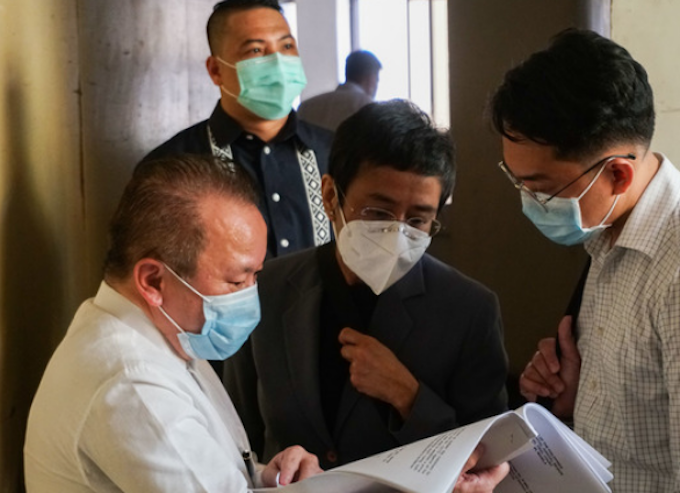
By Lian Buan in Manila
Rappler chief executive Maria Ressa and former researcher-writer Reynaldo Santos Jr have filed a motion for partial reconsideration, appealing to Manila Judge Rainelda Estacio-Montesa to reconsider her decision that convicted the journalists of cyber libel.
Ressa and Santos’ lawyers from the Free Legal Assistance Group (FLAG) submitted their 132-page motion to the Manila Regional Trial Court (RTC) Branch 46 via email yesterday afternoon.
Copies were also mailed to the court and the prosecutors. The Manila RTC is still on lockdown due to possible exposure to personnel who were in contact with coronavirus-positive relatives.
READ MORE: ‘I’m scared to go to jail, I’m not as fearless as Maria’
The motion cited at least 13 errors committed by Judge Montesa in her June 15 verdict and accused her of malice.
In the motion, FLAG argued several key points and raised issues still largely unexplored with the very young, and still very contested, Philippine Cybercrime Law.
Among these are the following:
- Complainant Wilfredo Keng as public figure
- Malice
- Republication
- Prescription period of libel
- Intervention of the UN Special Rapporteur for Freedom of Expression, Professor David Kaye
- Imposition of fines instead of imprisonment for libel
The motion for reconsideration (MR) did not mince words in criticising Judge Montesa’s decision, saying “the court has resorted to language that borders on the sarcastic and, at times, crosses over to the partial”.
Free speech legal protection
FLAG asked the court to consider Philippine jurisprudence that fiercely protects free speech and apply them to the cybercrime law.
“The self-distancing by the court of this case from the issue of press freedom is so pronounced as to be unmistakable. In the process of that self-distancing, however, the fundamental principles of constitutional law on ‘content-based restrictions’ that have become hornbook law have been ignored,” said the MR.
Libel in the Revised Penal Code presumes malice in defamatory imputations even if they are true. Over the years, Philippine jurisprudence has made a distinction between a public figure and a private person, applying an actual malice rule for public figures.
It means that for a public official, malice on the part of the accused must be proven and not presumed.
Because the bar for determining malice is so high, even erroneous statements are not considered malicious – as long as there is failure to prove a “high degree of awareness of probable falsity”.
Judge Montesa ruled that because Wilfredo Keng was a private person, then malice was presumed.
FLAG said Keng was considered a public figure, citing the case Ayer vs Capulong which said a public figure was “anyone who has arrived at a position where public attention is focused upon him as a person”.
Public figure definition
“Its definition of a public figure is important to this case, as it clearly establishes that even non-governmental officials are considered public figures,” said FLAG, arguing that the rule on actual malice must be applied in the case.
Keng’s complaint was based on a 2012 story linking him to the late chief justice Renato Corona, who faced an impeachment trial.
Judge Montesa lectured the journalists on the supposed failure to verify information in an intelligence document that linked Keng to illicit activities in that story, saying that they were being reckless.
Before the verdict, United Nations Special Rapporteur on the Right to Freedom of Opinion and Expression Professor David Kaye submitted an unsolicited expert’s brief, making a case for how libel should be decriminalised, and how the court must prudently apply the cybercrime law while libel remains a criminal offence.
Judge Montesa merely “noted” Kaye’s brief, which, in the judiciary, means it was just acknowledged for the record.
International law principles
“With due respect, considering the opinion of Professor Kaye in his Brief would allow the court to arrive at a judgment that is more in accord not only with the facts and evidence presented during the trial but also with international law principles that govern the country’s commitments under the International Covenant on Civil and Political Rights (ICCPR),” said the motion.
As a final argument, FLAG said Judge Montesa should have been guided by jurisprudence, and by the Supreme Court’s own circular, that if it can, courts must impose only fines rather than imprisonment on libel cases.
Ressa and Santos were sentenced to a maximum of 6 years in jail.












































